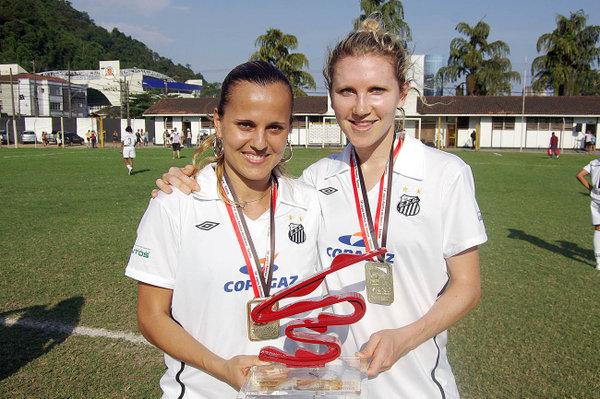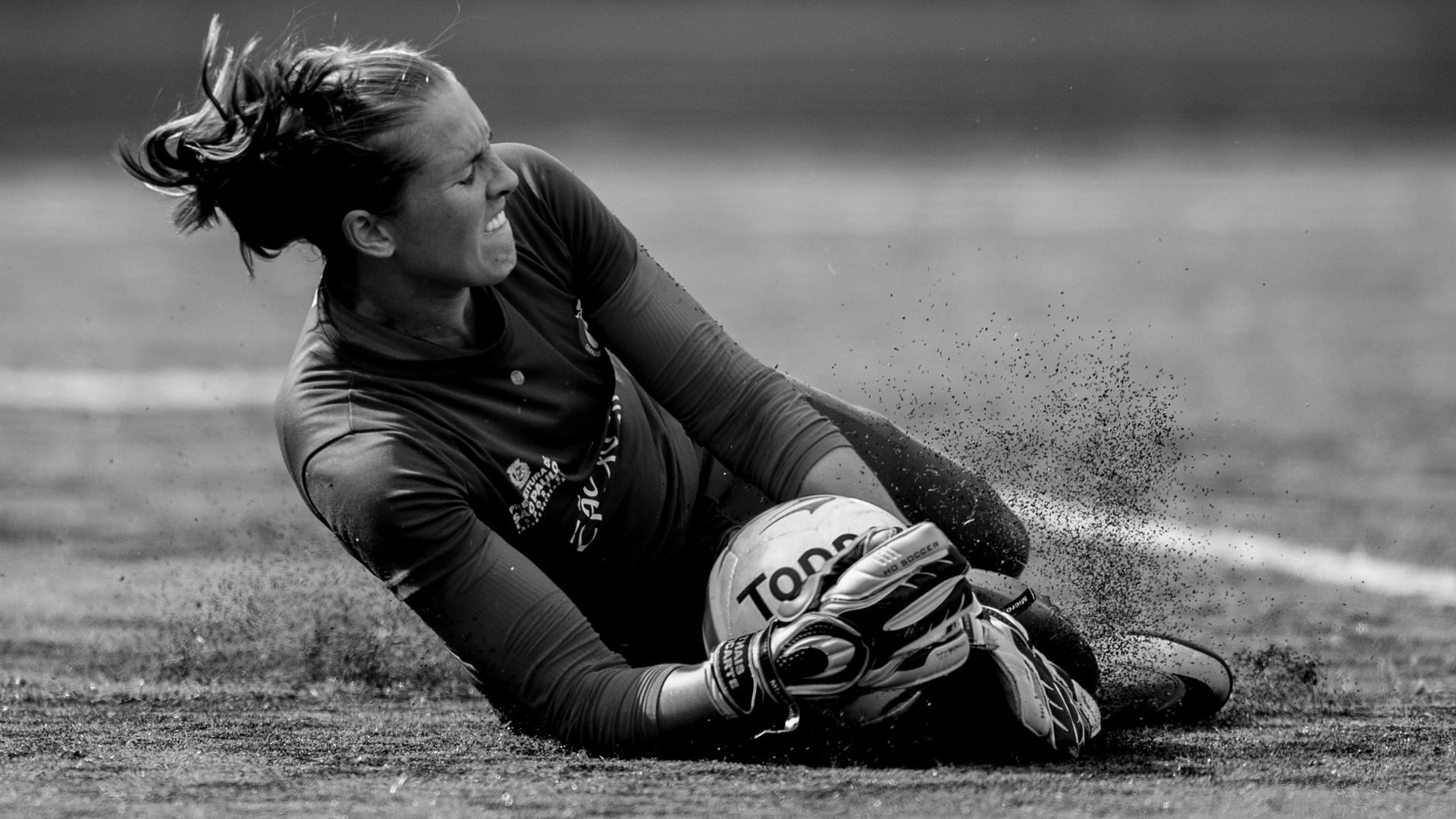Thais Picarte, a goalkeeper for Brazil and lead ambassador of the Guerreiras Project, grabs the ball in São Paulo.
From 1941 to 1979, girls and women in Brazil were legally banned from playing soccer, professionally, in school, even for fun. The game was seen as incompatible with the female body.
After the ban was lifted, Brazilian girls were still discouraged from playing. Parents didn’t want their daughters’ playing a "man’s game." Women who played were regarded as lesbians, not meant in a kind way.
Caitlin Fisher didn't experience these problems growing up in the US. She went on to play soccer at Harvard where she was selected as an all-Ivy league player. Ten years ago, upon graduation, at age 22, Fisher moved to Brazil and soon after began to play professionally there.
“I knew there’s a lot of machismo around football [soccer] in Latin America and that the women’s game has not been as popular or successful as it has in the US and other countries,” said Fisher. “I was slightly aware of this going down, but it was really a slap in the face experiencing it down there, playing it, living it, breathing it.”
These experiences led Fisher into activism: She co-founded the Guerreiras Project to bring attention to gender equity on the fields.
“Guerreiras, it’s a Portuguese term. It translates to ‘female warriors,’" she said.
“It’s one of the first words I learned in Brazil, from my teammates who use it, really self-identify as female warriors, as women playing football in the country of men’s football. You have to be warrior, you have to be a fighter to be able to do this.”
The Guerreiras Project began with stories about women playing soccer and the prejudice in the women’s game. It grew and grew, adding more voices and stories.
During the World Cup, the Guerreiras Project will display a multimedia exhibition about female players in the cities of Rio de Janeiro and Porto Alegre.

“[Female players] have had the opportunity to contribute anything — jerseys, photos, videos, cleats, goalie gloves — whatever it is they want the world to see and hear about their experiences,” Fisher said.
Just as the World Cup has opened dialogues about social justice in Brazil, Fisher, who recently retired from playing professional soccer due to an injury, hopes to use the spotlight on Brazil to spur conversations about gender justice and sports in her adopted country.
“What is this struggle? Why does it require courage to be a woman playing?” she asked.
Fisher said things have gotten better for Brazilian female soccer players in recent years — they’re more accepted as athletes.
“One of my friend’s was saying — she’s older, she played with the National Team — she said, ‘Look, a lot of the prejudice has faded inside the house. We have the support of our families now, we have the support of our parents, and we have the support of the people even.’”
But the women don’t have the support of the clubs, schools or people with the money. Brazilian women are nowhere close to the men with regards to resources or financial support. Top professional women tell stories about working out in the morning, washing their own uniforms by hand, then returning to practice later in the day.
Fisher played for the Santos Club, one of the most successful and famous soccer clubs in Latin America. The women’s team folded in 2012, in large part to pay the new contract for of its star player, Neymar, who was 19 at the time and was paid an estimated $868,000 a month.
“One month of his salary would’ve covered the whole cost of the whole women’s team for the whole year,” said Fisher, who believes that moments like this have left many female soccer players in Brazil feeling deflated.
“There is this growing sense of pessimism that it’s not going to change.”
“Não vai mudar,” her teammates tell her in Portuguese. “It’s not going to change.”
From 1941 to 1979, girls and women in Brazil were legally banned from playing soccer, professionally, in school, even for fun. The game was seen as incompatible with the female body.
After the ban was lifted, Brazilian girls were still discouraged from playing. Parents didn’t want their daughters’ playing a "man’s game." Women who played were regarded as lesbians, not meant in a kind way.
Caitlin Fisher didn't experience these problems growing up in the US. She went on to play soccer at Harvard where she was selected as an all-Ivy league player. Ten years ago, upon graduation, at age 22, Fisher moved to Brazil and soon after began to play professionally there.
“I knew there’s a lot of machismo around football [soccer] in Latin America and that the women’s game has not been as popular or successful as it has in the US and other countries,” said Fisher. “I was slightly aware of this going down, but it was really a slap in the face experiencing it down there, playing it, living it, breathing it.”
These experiences led Fisher into activism: She co-founded the Guerreiras Project to bring attention to gender equity on the fields.
“Guerreiras, it’s a Portuguese term. It translates to ‘female warriors,’" she said.
“It’s one of the first words I learned in Brazil, from my teammates who use it, really self-identify as female warriors, as women playing football in the country of men’s football. You have to be warrior, you have to be a fighter to be able to do this.”
The Guerreiras Project began with stories about women playing soccer and the prejudice in the women’s game. It grew and grew, adding more voices and stories.
During the World Cup, the Guerreiras Project will display a multimedia exhibition about female players in the cities of Rio de Janeiro and Porto Alegre.

“[Female players] have had the opportunity to contribute anything — jerseys, photos, videos, cleats, goalie gloves — whatever it is they want the world to see and hear about their experiences,” Fisher said.
Just as the World Cup has opened dialogues about social justice in Brazil, Fisher, who recently retired from playing professional soccer due to an injury, hopes to use the spotlight on Brazil to spur conversations about gender justice and sports in her adopted country.
“What is this struggle? Why does it require courage to be a woman playing?” she asked.
Fisher said things have gotten better for Brazilian female soccer players in recent years — they’re more accepted as athletes.
“One of my friend’s was saying — she’s older, she played with the National Team — she said, ‘Look, a lot of the prejudice has faded inside the house. We have the support of our families now, we have the support of our parents, and we have the support of the people even.’”
But the women don’t have the support of the clubs, schools or people with the money. Brazilian women are nowhere close to the men with regards to resources or financial support. Top professional women tell stories about working out in the morning, washing their own uniforms by hand, then returning to practice later in the day.
Fisher played for the Santos Club, one of the most successful and famous soccer clubs in Latin America. The women’s team folded in 2012, in large part to pay the new contract for of its star player, Neymar, who was 19 at the time and was paid an estimated $868,000 a month.
“One month of his salary would’ve covered the whole cost of the whole women’s team for the whole year,” said Fisher, who believes that moments like this have left many female soccer players in Brazil feeling deflated.
“There is this growing sense of pessimism that it’s not going to change.”
“Não vai mudar,” her teammates tell her in Portuguese. “It’s not going to change.”
The story you just read is accessible and free to all because thousands of listeners and readers contribute to our nonprofit newsroom. We go deep to bring you the human-centered international reporting that you know you can trust. To do this work and to do it well, we rely on the support of our listeners. If you appreciated our coverage this year, if there was a story that made you pause or a song that moved you, would you consider making a gift to sustain our work through 2024 and beyond?
